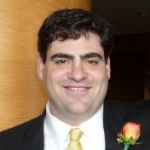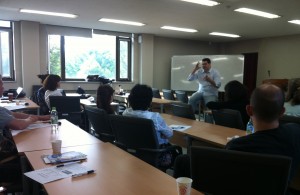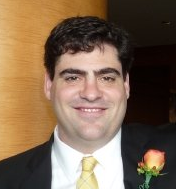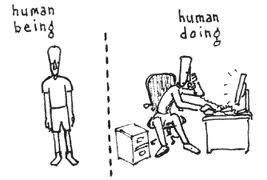Michael Griffin – Korea
Michael Griffin is a teacher and teacher educator. Mike has been involved in English education in Northeast Asia for over a decade. He currently lives and works in Seoul and is online a lot. Mike’s current professional interests are teaching unplugged, observation/feedback, and reflective practice. In addition to being a #TESOLgeek he’s also interested in history, politics, sports, and technology.
What are you passionate about, Michael?
I love to see students and teachers able to do something that once seemed incredibly challenging or even impossible. Helping people set, work towards and achieve their goals really drives me. I don’t want to sound like I am super altruistic but I genuinely (and perhaps even selfishly) enjoy the buzz that comes from helping people. Oftentimes, this comes from just helping people see what they are already doing well. I think teachers and students typically expect negative feedback on what they did “wrong.” I can’t deny that this can sometimes be useful but I greatly enjoy helping people see what they are doing well and what they might want to keep doing. Aside from teaching, I love reading, traveling, talking to people, and feeding my Internet addiction. Combining the first two is ideal. I think I am at my happiest when reading a good book in a hammock near the beach.
How and why did you become a teacher?
I often smile when I think about what my high school teachers might say if they heard I am a teacher! I was not, shall we say, a very good student. Becoming a teacher was the furthest thing from my mind. More time in school? No thank you. I think I felt like I’d spent more than enough time in class even if I didn’t study much. How, then, did I decide I wanted to teach? It all started in Morocco in the spring of 1999. I was studying abroad in Seville and I went to Morocco on a whim with a bunch of near strangers. I bonded with a few people on the trip and had a fantastic time. I loved my time in Spain and learned a lot about myself and about the world, but those 4 days in Morocco were life changing. I think I decided against a normal life suddenly while being accosted in the market by someone trying to sell me a belt. I decided then and there that I needed to see the world!
When I got back to the states and my sleepy college town for my senior year, I hatched a plan. I would see the world right after college by teaching and traveling at the same time. I’d heard vague rumors about people doing such a thing in Spain and I thought I would give it a try. I enrolled in a course on TESOL that was taught by the amazing Chris Mares, and I was pretty hooked from the beginning. Even so, I still didn’t think it was something I would do for very long.
I started teaching about 1 month after finishing college. Again, I really just wanted to see the world. I guess I was in some ways sort of the typical backpacker teacher because travel was surely on my mind. My original plan was to live and teach in 5 countries before settling down and finding a real job. I planned on moving each of the 5 years, but I discovered that I enjoyed Jinju in the south of South Korea very much. I ended up staying for nearly 3 years.
I guess I’d been teaching for about 4 years before I really started taking it seriously as a career. By that point I loved it so much it would have been extremely difficult to do something else. I often think that even if I had a completely different job I’d need and want to teach a bit on the side just for fun. It really is fun for me! What started out as a bit of wanderlust turned into a career. Even though my original plan called for 5 countries in 5 years I’ve only lived in two counties –Korea and Japan — over 12 years and I couldn’t be happier.
What are you most interested in right now?
I guess the most interesting and exciting thing for me at the moment is finding, building and participating in positive communities among ELT professionals. In the last year or so I have met some wonderful people. I think sometimes it can be hard to find like-minded professionals and I am especially grateful that I have been able meet and work with so many excellent people. The three main communities on my mind at the moment are the KOTESOL Reflective Practice SIG (RPSIG), the general ELT twitterverse, and #KELTchat (http://keltchat.wordpress.com/).
Along with Manpal Sahota, I am one of the co-facilitators of the RPSIG and since the inception of the group in early 2011 we have been collecting curious and reflective members. Monthly meetings are now happening in Seoul, Daejon, Daegu and Busan where reflective practitioners join to talk and think about teaching, learning and reflection. I think this is extremely exciting and I think it can be a very positive step for ELT in Korea.
I joined Twitter in October 2011, after a recommendation from none other than Chuck Sandy in his awesome presentation about communities at the Kotesol International Conference. I was actually quite skeptical about the power and use of Twitter, but I gave it a chance and I think I have been rewarded ten-fold. I am in awe of the group of educators that I am in contact with daily. The laughs, supports, nudges, insights, tips and questions have all been a treasure for me.
#KELTchat is another new group that is starting to pick up steam. What started with an innocent question about hashtags from Alex Grevett has turned into a thriving community that I am very proud to be a member of. We usually meet twice a month for live moderated chats on Twitter but we also share links, ideas, questions, trials, tribulations, and successes through the hashtag on Twitter. I am also very pleased that we will be presenting about #KELTchat at the 2012 Kotesol International Conference.
What things do you do to help you get better at being a teacher, Michael?
Working with other teachers as a trainer or trainer-trainer or instructor or as a mentor or critical friend is extremely helpful for me. I can see images of myself in what people say and do and this makes me more aware of what I am doing and not doing in the classroom.
Experiences training Korean public school teachers have been invaluable for my own development as it has helped me call into question some beliefs that seemed quite obvious to me previously.
Aside from being on Twitter and blogging, I get a lot benefits from just talking with other teachers here in Korea. I met some through #KELTchat, some through the SIG, some are my former or current training course participants, some are my training colleagues and some I just met quite randomly. Once again, I am extremely grateful to be a part of such wonderful communities.
Finally, I have also been presenting a lot in the last year. I guess I’ve presented 10 times this year already. I think this is a good way to develop professionally as well. Sometimes I chose a topic that I was interested in but didn’t know much about, and the fact I had to present on it helped me find out more and more about it and was quite a nice nudge.
What advice would you give to a teacher just starting out on a journey of professional development?
Just start! No really. I think a lot of time we want to wait until the time is right. We want to wait till this term is over or until something else happens in our personal life or we are totally ready for it. I think that we can start by starting and take things as they go. Perhaps this advice, like many kinds of advice is just a form of nostalgia, as I wish that I had taken professional development seriously from the start. I also firmly believe that reflection is the key to professional development. Without reflecting I am not sure that we will get as much out of our experiences as we otherwise could.
Michael, is there any blog or online link you’d like to recommend?
I’d hope and expect that most iTDi folks would know about Josette Leblanc’s (@JosetteLB) blog http://tokenteach.wordpress.com/ already. This is the blog that got me back interested in reading blogs after taking a few years off. It is also from the person that encouraged me to start a blog of my own! I am amazed at the quantity and quality of ELT blogs out there. It can be hard to keep up. I also think there are great things going on with blogs focused on teaching and learning here in Korea. My sense is that previously there were a lot of blogs about expat life and living in Korea but not so many about actual teaching. It is refreshing and wonderful to see blogs focused on teaching and learning.
Here are some blogs from teachers in Korea that have caught my eye this year:
http://www.alienteachers.com/ by Alex Walsh (@AlexSWalsh)
http://breathyvowel.wordpress.com/ by Alex Grevett by (@breathyvowel)
http://observingtheclass.wordpress.com/ by John Pfordresher (@JohnPfordresher)
http://lizzieserene.wordpress.com/ by Anne Hendler (@AnneHendler)
http://barryjameson.blogspot.kr/ by Barry Jameson (@BarryJamesonELT)
Other links? Hmm, of course, http://zombo.com/
What’s your favorite quote about being a teacher?
I have two quotes that are very central to my ideas about teaching and learning.
“The perfect is the enemy of the good.” – Voltaire
“It’s not the answer that enlightens but the question.” – Eugène Ionesco
Is there any thing else you’d like to say?
Yes, there is, and this goes back to challenges. For me the biggest challenge these days is time management. . I have a tendency to pile things on during the semester and then find myself with lots of responsibilities and a lack of time. With so many things going on and so many interesting things and people catching my attention I sometimes find it hard to stay focused and use my time as fruitfully as possible. I am still working on and thinking about this, but some things that help me manage my time better include using to-do lists to helps me see what is in front of me. It is also pretty fun to cross an item of the list.
If I am pressed for time I use “Chrome Nanny” to block myself from Facebook and Twitter. I schedule regular breaks and do my best to enjoy the breaks so as to come back refreshed and ready to work. I find it useful to complete one thing before moving on to the next one, that way I can focus all my attention on the thing that I am doing. Sometimes just starting, instead of worrying about the task at hand is the best way. Finally, I am trying to be more selective about accepting responsibilities. I try to make sure that I really want to do something or that I believe in it before taking on more commitments.








 Doing and Being: How Mike Rolls Michael Griffin
Doing and Being: How Mike Rolls Michael Griffin As an enthusiastic rule finder, bender, breaker and scoffer it was interesting and hopefully useful for me to think about which rules I always try to follow. For other teachers reading this who are allergic to rules being imposed on them (like me), I must mention that these are not rules I am suggesting you follow but just sharing rules that I choose to follow for myself.
As an enthusiastic rule finder, bender, breaker and scoffer it was interesting and hopefully useful for me to think about which rules I always try to follow. For other teachers reading this who are allergic to rules being imposed on them (like me), I must mention that these are not rules I am suggesting you follow but just sharing rules that I choose to follow for myself. As I wrote this list I realized that a lot of my rules are things to be rather than things to do. Perhaps this shows that for me a lot of teaching is more about being than doing.
As I wrote this list I realized that a lot of my rules are things to be rather than things to do. Perhaps this shows that for me a lot of teaching is more about being than doing.